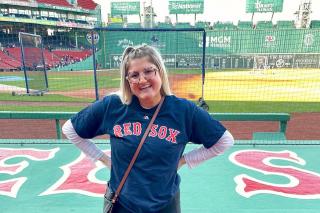Why led you to study Political Science at Simmons?
I was interested in a women-centered environment for college. I'm from Connecticut, so I was able to interact with Simmons Admission through an interview, tours, and an overnight stay. That helped me realize that I wanted to attend a small school with a real community.
Originally, I applied for the physical therapy program, but I ended up taking an Introductory Political Science class and it sparked my interest in American politics.
What did receiving a Pell grant to attend Simmons mean to you?
I was a first-generation college student. I didn't know how I was going to pay for an out-of-state private school. I didn't really know what things meant, like work-study. Did I have to pay it back? Was it just money for books? And what about the Pell grant, did I have to pay that back?
Once I researched the financial aid package, I was really excited that I was given these opportunities to make Simmons work. My parents took out a parent-flex loan, because the Pell grant only covers so much, which meant that I could have the college experience that I really wanted, and make the most of the experience.
What do you wish more people understood about Pell Grants?
You don't have to pay it back! Also, if you are eligible for a Pell Grant, there are so many other scholarships and grants that you may be eligible for, as well.
During my Master's, I wrote a policy brief about making college accessible, which included a recommended increase in the percentage of tuition the Pell Grant covers. The grant has stayed the same over the years, while college tuition increases. It's not keeping up with the cost of inflation in higher education.
How did you engage in the community while at Simmons?
My on-campus activities were some of my favorite Simmons experiences! The first thing I did was mentor for Strong Women, Strong Girls; I was able to do that as a work-study opportunity, thanks to Simmons. I really loved the opportunity to work in the Boston community.
When I moved on campus in Fall of 2015, I felt so far away from home. I panicked, and ended up taking a brief leave of absence two weeks into the first semester. The following year, my friends applied to be orientation leaders. I remembered being the only student crying during orientation, the year before. I saw this as an opportunity to help new students who were feeling the same way. Also, being an orientation leader, I made so many new friends that I may not have met otherwise — students in different classes, different majors, whom I may not have crossed paths with in class. I also learned more about the resources at Simmons, and was able to connect new students with those resources. The orientation leaders gathered early in the morning to scream welcome to new students - it was super high energy and a really awesome experience!
I became the Student Government Association (SGA) Communications Director, then Vice President the following year. It was challenging, but it was a great experience and being so involved in the community solidified my love for Simmons even more.
Tell us about your current role as a career resource specialist at The University of Texas at Austin Lyndon B. Johnson (LBJ) School of Public Affairs.
As an orientation leader, I learned that I loved working in higher education. As a career resource specialist, I offer mock interviews, help students with resumes and cover letters, and offer workshops to student organizations on salary negotiation and other topics.
I also bring employers on campus to talk to students about job opportunities. I've been able to work with local nonprofit organizations in Texas and federal government organizations, as well. I liaise with the CIA for the national security career fair, which includes the FBI and NSA, and offers really cool opportunities. I get so excited during employer events, whether it be government agencies, non profits or NGO's; it sparks my interest in politics and policy work.
How did Simmons prepare you to become a leader in your field?
I love that I'm able to use both of my degrees in political science and higher education. Simmons gave me access to explore the political arena in Boston and practice what I was learning. When I was studying a current bill in progress, I went to the state house and attended the hearing. I interned the Massachusetts Women's Political Caucus, as well as twice at the State House, one of which was as a Barbara Lee Fellow. These experiences gave me the confidence to develop the skills and knowledge that I use today to guide students.
Advice?
There is a lot of anxiety around applying and entering college. Here are my thoughts for any prospective students:
- First: Be proud of yourself for getting in!
- Look at other financial aid opportunities available. There's a lot of money out there and a lot of ways to get it. Go to your high school guidance counselor for assistance. If the federal government considers you a low-income student, there are a lot of other scholarships available to you. Seek out help to understand what they mean.
- Check out Simmons' resources for First-Generation students.
- Follow the University social channels to see what students are doing in Boston and on campus.
- When you arrive on campus, try to be present in the moment.
- If you're struggling, speak up. My Freshman year, I thought I was the only one struggling to adjust. Since then, I've talked to so many people and learned that my experience wasn't uncommon, at all.

